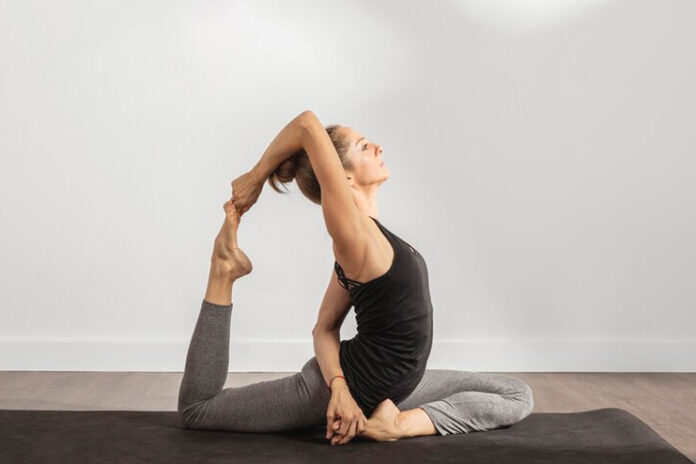Affiliate Disclaimer
Some links in this article are affiliate links. We may earn a small commission if you make a purchase through these links, at no extra cost to you. We only recommend products we find useful to our readersIt is impossible to overestimate the importance of yoga in promoting physical strength and awareness in a world full of constant demands and tensions. With its roots in ancient traditions, yoga has developed into a holistic discipline that addresses the complex relationship between the mind and body. This article seeks to illuminate the transforming potential of yoga, highlighting its diverse function in fostering physical and mental well-being.
The advantages of regular yoga practice transcend the studio setting and become ingrained in daily life. Yoga offers a haven for anyone looking to escape the chaotic pace of modern life through deliberate breathing, conscious movement, and concentrated meditation. It serves as a medium for developing an acute awareness of the present, enabling yoga enthusiasts to manage life’s intricacies with equilibrium and serenity.
As we explore the subtle aspects of yoga, this talk aims to highlight the significant benefits of integrating yoga into one’s everyday practice.
Understanding Mindfulness in Yoga
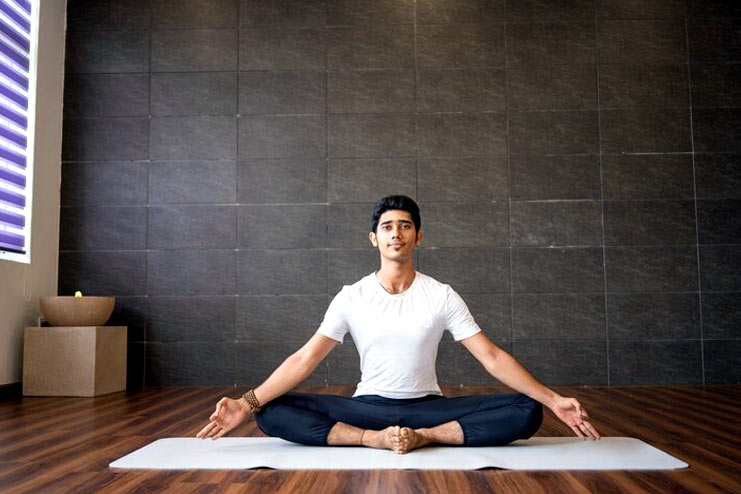
Mindfulness is fundamental to yoga’s transformational potential, which gives followers a profoundly connected mind, body, and spirit. Within yoga, mindfulness refers to being present in the here and now, developing an awareness that permeates each breath and movement. It goes beyond physical postures to become a comprehensive way of living mindfully and with intention.
The exquisite connection of breath, movement, and awareness—which results in a profound and harmonious union—lays the foundation of yoga. A thoughtful dance evolves as yoga lovers skillfully match their breath with each deliberate stance, cultivating a deep feeling of mindfulness.
This synchronization develops into an intentional and aware interaction with the current moment, going beyond simple rhythmic harmony. The breath, also known as the vital force, acts as a compass to keep the mind centered in the present moment.
Through this complex interaction, the breath creates a transforming bridge between the outside and inside worlds, enabling yogis or yoginis to reach new levels of self-awareness and establish connections with their surroundings. As a result, yoga transcends beyond its physical form and becomes a path of introspection and conscious awareness, on which each breath and action leads to a profoundly healing experience.
Yoga is an effective method for developing acute awareness and present-moment attention. Through the complex web of positions and movements, people discover how to accept the richness of every moment and analyze their thoughts objectively. Beyond the mat, this practice permeates daily life, enabling people to face obstacles with a calm and collected attitude.
Through yoga, one can intentionally cultivate mindfulness, a transforming journey that offers a sanctuary where inner serenity and clarity replace the chaos of the outside world. Yoga seekers embark on self-discovery and well-being as they explore the nuances of breath, movement, and mindfulness.
Related Article: 6 Reasons Why Yoga is Taking Over Fitness
Daily Pose Routine: Strengthening and Mindfulness
1. Mountain Pose (Tadasana):
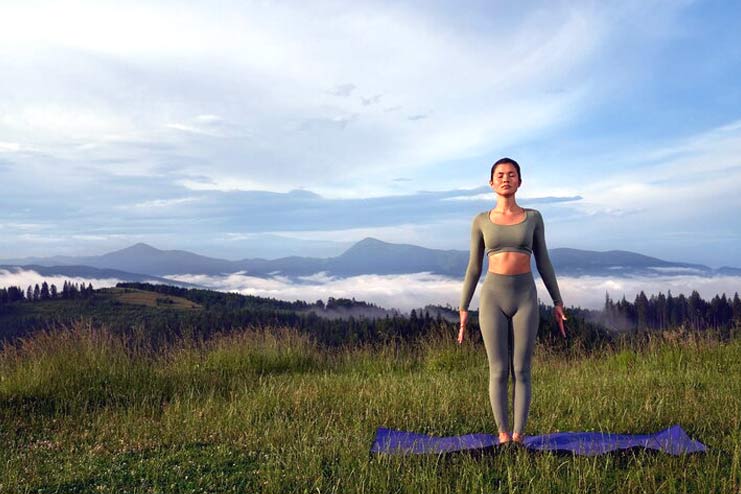
Beginning your daily yoga practice with the grounding embrace of Mountain Pose, also known as Tadasana, is a great way to connect with yoga practice. Maintain an upright posture with your feet standing hip-width apart and your weight distributed evenly. Experience a sense of connection to the earth by establishing a root system via the soles of your feet. Raise your chest, engage your thighs, and stretch your arms either beside your body or overhead with your palms facing each other.
Your thighs should be engaged. In this foundational position, you are not simply standing but making a conscious effort to align your spine, activate your muscles, and develop a sturdy foundation.
Draw your shoulders down, lengthen your neck, and find a steady gaze to maintain your posture. In Tadasana, you are not simply standing; you are experiencing a moment of silence and presence, establishing a sense of grounded awareness that will follow you throughout your practice.
Related Article: Tantric Yoga: What is Origin, Ways to Practice Everything You Should Know
2. Downward-Facing Dog (Adho Mukha Svanasana):
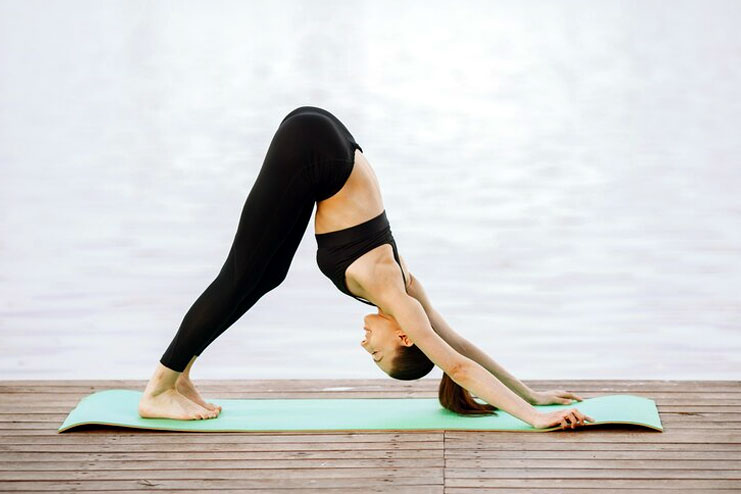
Adho Mukha Svanasana, also known as Downward-Facing Dog, symbolizes the transition into the energizing The Adho Mukha Svanasana, often known as the Downward-Facing Dog,. Forming an inverted V-shape, elevate your hips toward the sky while seated on a tabletop.
Spread your fingers, press your palms into the mat, and engage your core. The deep stretch you feel along your back, hamstrings, and calves should result from allowing your heels to descend toward the earth.
Within the context of this stance, the combination of breath and movement transforms into a dance, a deliberate investigation into the body’s capacities. Pay attention to the rhythmic flow of your breath as you strive to achieve a state of stillness in the pose.
Downward-Facing Dog is not merely a stretch; it is a moment of full-body involvement, a conscious pause that establishes the tone for the remainder of your practice.
3. Warrior Pose Series (Virabhadrasana):
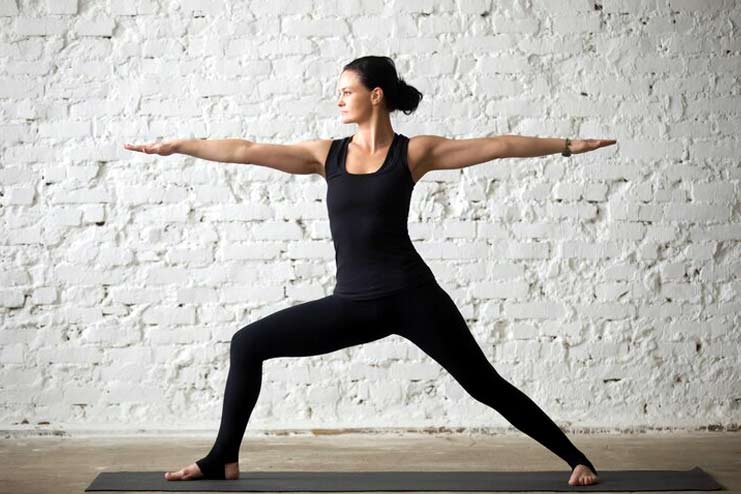
Dive into the Warrior Pose Series, which consists of three positions: Virabhadrasana I, Virabhadrasana II, and Virabhadrasana III. This sequence is a strength-building and balance-building routine. Step forward one foot, then bend the knee and stretch your arms above your head to assume the Warrior I position.
Move your hips so that they are squared to the front, and feel the stretch in your back leg. Warrior II: Extend your arms parallel to the ground while opening your hips and shoulders to the side. Position yourself in this position.
By shifting your weight to one leg and extending the other behind you, you may create a straight line from your head to your heel in the Warrior III position.
Maintain your attention on the deliberate alignment of your body during each variation. The purpose of warrior poses is not simply to demonstrate physical strength; instead, they are meant to represent the spirit of a warrior, which is robust, rooted, and resilient.
4. Tree Pose (Vrksasana):
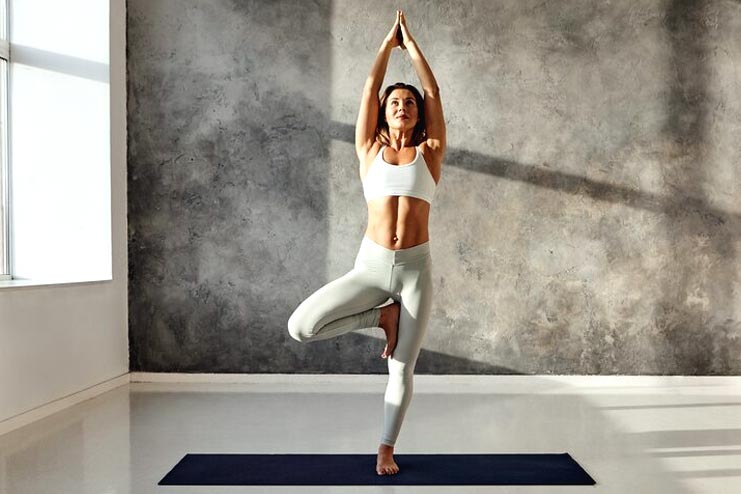
A transition must be accomplished to enter the elegant and balancing Tree Pose, or Vrksasana. One foot should be planted firmly on the ground, and the sole of the other foot should be placed on the inner thigh or calf, leaving the knee unaffected.
When you have located a focal point, bring your hands together in the middle of your chest, and then stretch your arms above your eyes. This pose will test your equilibrium and require strength and concentration.
Enjoy the sensation of the roots of your standing foot helping to ground you as you stand tall in a tree pose. At the same time, your lifted foot is reaching upwards towards the heavens.
While in this state of equilibrium, work on developing a profound sense of focus and stability. In Tree pose, you are not simply standing on one leg but attempting to establish poise amid hardship, which helps you anchor yourself in the present moment.
5. Child’s Pose (Balasana):
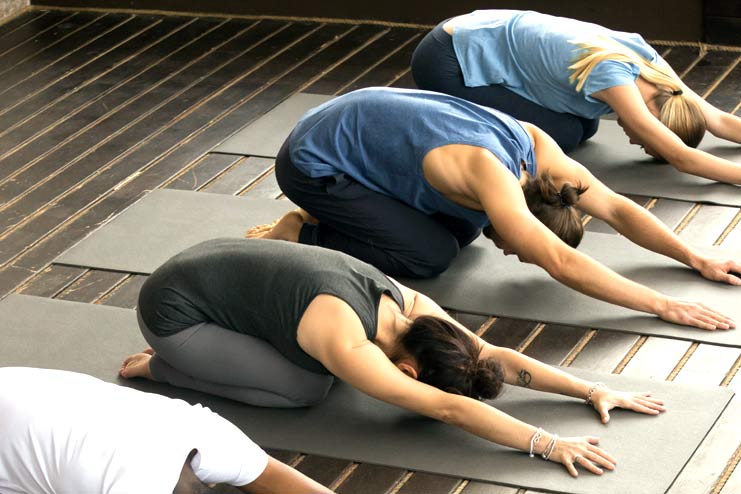
Bring your daily practice to a close with the calming embrace of Child’s Pose, also known as Balasana. You should get down on your knees on the mat, sit back on your heels, and extend your arms forward while bringing your chest closer to the ground.
A sanctuary for peaceful contemplation is created by adopting this vital position, which encourages relaxation and introspection inside the yoga enthusiast.
It would help if you allowed your forehead to rest on the mat while you yielded to the mild stretch in your back. It will help you release any tension that may be present in your neck and shoulders.
A moment of surrender, a purposeful act of letting yourself rest and renew, is what Child’s Pose is all about. While in this position, bring your attention to the simplicity of your breath and allow each exhale to transport away the remnants of the day.
A portal to inner calm and a reminder that sometimes the most incredible strength resides in submitting and finding consolation in quiet, Child’s Pose is more than just a resting position; it is a doorway to inner serenity.
Conclusion
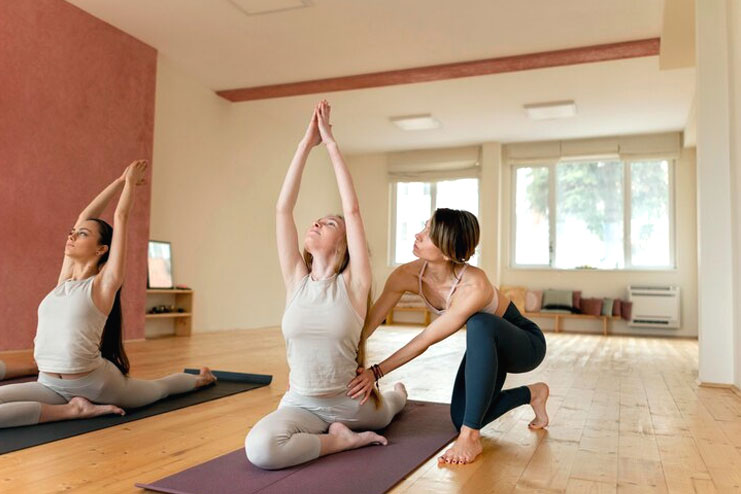
A regular yoga practice, with its profound fusion of strength-building poses and mindfulness, is the key to achieving total well-being. By consciously combining the grounding of the Mountain Pose, the full-body stretch of a Downward-Facing Dog, the strengthening of warrior poses, the focus of the Tree Pose, and the relaxing of the Child’s Pose, one sets out on a life-changing path toward resilience and balance.
As you reflect on the meaning of these positions, acknowledge the possibility that they can foster a stronger bond between the body and the mind. Accept the practice of yoga as a daily ritual for its physical advantages and the mental clarity it imparts, which builds a strong foundation for overcoming obstacles in life.
I invite you to integrate these poses into your everyday practice to advance on your path to well-being. Start with little, deliberate steps and see how your general health improves over time. Seek advice from qualified instructors who can customize a practice to meet your needs.
Related Article:
Reference
https://positivepsychology.com/mindfulness-yoga/#:~:text=In%20fact%2C%20yoga%20without%20mindful,it%20is%20in%20that%20moment.
https://yogaed.com/resources/5-ways-mindfulness-yoga/
https://greatergood.berkeley.edu/topic/mindfulness/definition#:~:text=Mindfulness%20means%20maintaining%20a%20moment,through%20a%20gentle%2C%20nurturing%20lens.
https://www.yogajournal.com/poses/mountain-pose/#:~:text=Tadasana%20(Mountain%20Pose)%20seems%20pretty,your%20sides%2C%20palms%20facing%20forward.
https://www.yogabasics.com/asana/mountain/
https://www.yogajournal.com/poses/downward-facing-dog/
https://www.verywellfit.com/downward-facing-dog-adho-mukha-svanasana-3567072
https://www.yogajournal.com/poses/warrior-iii-pose/
https://www.yogabasics.com/connect/warrior-poses/
https://www.tummee.com/yoga-poses/tree-pose#:~:text=In%20Sanskrit%2C%20Vrksa%20means%20tree,upwards%20and%20downwards%20building%20stability.
https://www.yogajournal.com/poses/tree-pose-2/
https://www.webmd.com/fitness-exercise/how-to-do-childs-pose
https://www.yogajournal.com/poses/child-s-pose/
In this Article















